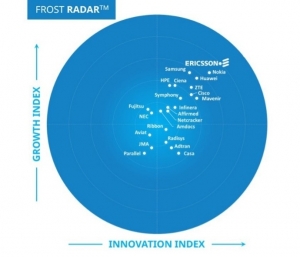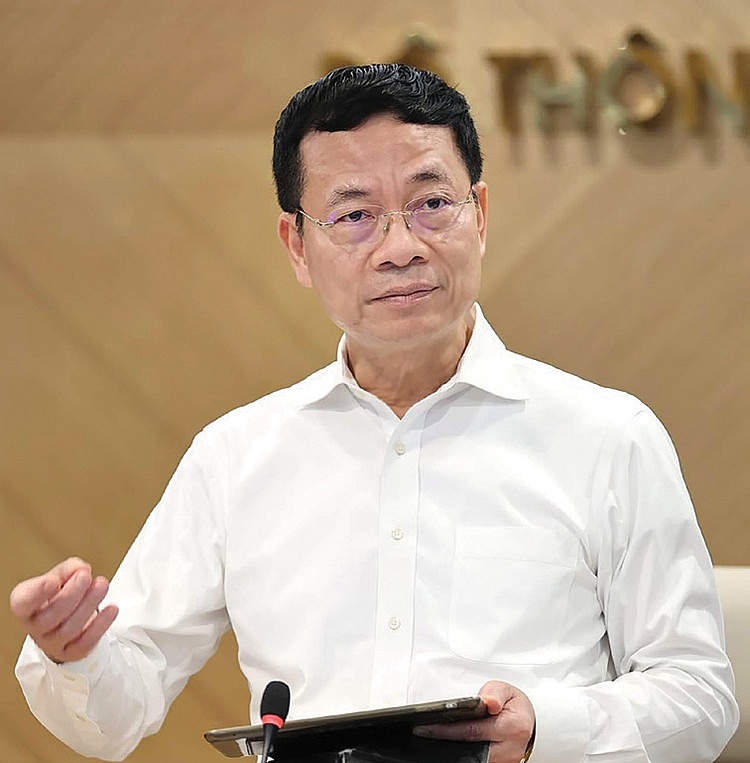5G opportunities opening for enterprises in Vietnam
Looking at Vietnam’s moves and efforts, how far has the country gone in its digital transformation journey?
 |
| Rita Mokbel, head of Ericsson Vietnam |
Vietnam is on track in creating and generating its next wave of sustained and inclusive socioeconomic development through science, technology and innovation, enabled by 5G and Industry 4.0. The recent spectrum auctions and the allocation of spectrum by the Ministry of Information and Communication is a very significant development for the industry.
We believe that 5G will serve as the foundation for the digital infrastructure that will be a key enabler for the government’s drive towards a digital economy.
We fully support the Vietnamese government’s ambition to promote the digital transformation of industry and society through mobile broadband technology. 5G will serve as the digital highway in the country. The operators and the government are making the investments to enable the same.
How has the Vietnamese government’s digital transformation strategy and related supporting policies been supporting enterprises?
With 5G, Vietnam can leverage the benefits of the digital infrastructure to accelerate the adoption of Industry 4.0, achieving a labour productivity growth rate target of 7.5 per cent per annum by 2030, helping drive increased efficiencies across all industries, including manufacturing, agriculture, logistics, transport, energy, healthcare and education.
In addition to attracting more high-tech foreign investment through this increased productivity, Vietnam will also use 5G as an education and innovation platform to help stimulate startup entrepreneurship, creating new industries, companies and jobs of the future.
The growth of the 5G innovation ecosystem will significantly accelerate the adoption of Industry 4.0, driving improved labour productivity through increased automation. The Vietnamese government is very well focused on driving education and training with the aim of ensuring the workforce is digitally upskilled and reskilled in preparation for the new jobs that will be created in the future.
All of this will enable Vietnam to fully leverage the benefits of the strong digital infrastructure for the benefit of enterprises.
Vietnam is striving to make 5G commercialisation ready by early next year. What will be the 5G opportunities for those involved?
Enterprises globally are increasingly looking to invest in modernising their legacy systems with new technologies and applications, which will also drive innovations, operational efficiencies, and growth.
Let me share with you an example that shows the value 5G provides to industries. Belfast harbour in Northern Ireland had an ambition to become the world’s smartest and most efficient port. With a lot of activity and logistics challenges to solve, this put high requirements on mobility and connectivity.
Together with BT and Ericsson, Belfast harbour deployed a private 5G network solution, and could achieve 20 per cent cost savings related to condition-based monitoring and a 50 per cent reduction in time spent inspecting inaccessible assets, supported by drones. It is also expected to see over 55 per cent reduction in installation and maintenance for CCTV cameras.
With 5G, advanced features such as speed, time-bound latency, network slicing, and authentication mean new differentiated performance services can be created.
This is where network APIs and a global network platform come into play. Network APIs put the capabilities of the network at the fingertips of the global developer community, who in turn will create new and innovative use cases. For example, authentication without passwords or low-latency performance for superior extended reality experiences.
With our acquisition of Vonage in 2022, we now have a top communications platform as a service model with a powerful ecosystem community of over one million application developers, and we want to partner with service providers in Vietnam and other parts of the globe towards building this ecosystem together.
How can Ericsson’s latest radio portfolio additions support manufacturing enterprises in their digitalisation?
5G utilisation will pave the way for increased investments in smart manufacturing capabilities in Vietnam, supporting the government’s vision and focusing on driving an increased and sustainable annual productivity growth in the country.
As a long-standing partner, Ericsson will leverage its technology leadership and expansive 4G installed base – which can seamlessly and efficiently be upgraded to 5G. We are also proactively working with mobile service providers to ensure Vietnam is at the forefront of 5G developments, sharing the technical capabilities as well as global, regional, and local market insights.
Our strengthened portfolio and global experiences can accelerate the 5G journey of our customers in Vietnam and support the country’s digitalisation ambition. For example, Ericsson’s 5G smart factory in Texas has been recognised by the World Economic Forum as a global front-runner for Industry 4.0. Since commencing operations in 2020, the smart factory team has developed 25 different use cases, to be deployed at scale in less than 12 months.
We will work with enterprises in Vietnam to bring the full benefits of 4G/5G connectivity to enterprises in Vietnam. 5G will provide the critical infrastructure that will drive that digital transformation in Vietnam and enable the country to achieve its Industry 4.0 vision. Here in Vietnam, we have already started seeing pilot cases for 5G dedicated networks in manufacturing, smart port, mining and logistics in Vietnam
The biggest challenge for enterprises can initially be the lack of deep dive industry knowledge to formalise the exact need and requirements towards the solution provider. Based on our global experience, we will work very closely to assist in closing the gap.
| Nguyen Manh Hung, minister of Information and Communications
Vietnam’s digital transformation programme is entering its fifth year. Over the past four years, we have gained some valuable experience to determine more effective ways to work. We still face the issue of where the money is and how to spend it. In May, the Ministry of Finance was expected to complete a decree on financial sources from the regular state budget, and the Ministry of Information and Communications (MIC) had to complete a decree on how to spend money in a feasible and efficient manner. We learnt that pilots should be carried out until we achieve success, and then duplicate them nationwide. Digital transformation must be carried out 100 per cent to be effective, but there cannot be enough resources, especially human resources, to carry out pilots nationwide. Therefore, focusing on piloting in one or two provinces, and involving one or two ministries until we reach success, is a convenient method. In the second quarter, the MIC will summarise a successful model of comprehensive online public services in one province, a successful model of a smart operating centre in one province, and a successful model of digital transformation at the ministry and government agency level. And from the end of the second quarter, they will be widely replicated. At the same time, the MIC will have to clarify what the most basic things are about digital transformation at the provincial, ministerial, and sectoral levels and provide detailed instructions covering digital transformation, economy, and data. Today, AI has entered the stage of widespread application. We must bring some sample AI applications to state agencies’ performance this year. In the second quarter, the ministry will release a number of sample applications for widespread application. When applying AI, it should be noted that the narrower the AI is, the easier it is to train and the more effective it is. Vietnam’s AI platforms must create tools for users to input their data and train. The MIC will also begin to introduce successful formulas on digital transformation for all fields and levels so that they can be communicated and replicated. Formulas for success that are short, true to their essence, and easy to understand will truly be comprehensive and strong. |
 | Ericsson committed to digital transformation with 5G With Vietnam’s plan to commercialise 5G in 2024, Ericsson continues to deliver on its commitment to support Vietnam’s accelerated digital economy journey. Rita Mokbel, head of Ericsson Vietnam, talked to VIR’s Bich Thuy about the plans to make this happen. |
 | Sustainability for long-term value creation Ericsson was founded on the belief that communication is a basic human need and with a vision to change people’s lives. And for over 145 years, the company has played a critical role in transforming lives, industries, and society for the better. The company puts focus on embedding sustainability programmes and practices across the organisation to create unimaginable opportunities and deliver positive impact to stakeholders. |
 | Accelerating Vietnam’s journey towards 5G 5G remains on track to become the fastest-adopted mobile generation: 5G mobile subscriptions are forecast to have topped 1.6 billion at the end of 2023, and 5.3 billion by 2030. However, we are still early in the 5G cycle and only 28 per cent of 4G sites globally have been upgraded to 5G mid-band. Likewise, only 1.6b 5G subscribers, out of a total of 8.5b mobile subscriptions, enjoy the benefits of 5G. |
 | Ericsson tops 5G network infrastructure market ranking Ericsson has been ranked top of the Frost Radar™ 5G Network Infrastructure Market 2024 analysis for the fourth consecutive year, highlighting the impact of the company’s strategy to meet the evolving needs of communications service providers (CSPs). |
What the stars mean:
★ Poor ★ ★ Promising ★★★ Good ★★★★ Very good ★★★★★ Exceptional
Related Contents
Latest News
More News
- Ho Chi Minh City launches plan for innovation and digital transformation (February 25, 2026 | 09:00)
- Vietnam sets ambitious dairy growth targets (February 24, 2026 | 18:00)
- Masan Consumer names new deputy CEO to drive foods and beverages growth (February 23, 2026 | 20:52)
- Myriad risks ahead, but ones Vietnam can confront (February 20, 2026 | 15:02)
- Vietnam making the leap into AI and semiconductors (February 20, 2026 | 09:37)
- Funding must be activated for semiconductor success (February 20, 2026 | 09:20)
- Resilience as new benchmark for smarter infrastructure (February 19, 2026 | 20:35)
- A golden time to shine within ASEAN (February 19, 2026 | 20:22)
- Vietnam’s pivotal year for advancing sustainability (February 19, 2026 | 08:44)
- Strengthening the core role of industry and trade (February 19, 2026 | 08:35)


 Tag:
Tag:



















 Mobile Version
Mobile Version